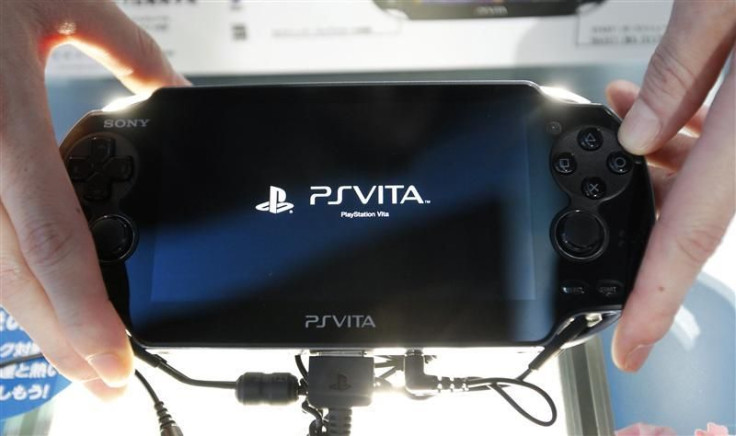Sony's Vita Arrives Just as Market May Be Fading

(Reuters) -- Sony Corp's Vita hits the United States on Wednesday, the latest in a long line of mobile gaming gadgets in the spirit of Nintendo's Game Boy and Atari's Lynx. But with gaming habits rapidly changing, it may also be the last of its breed.
Vita will be a tough sell to gamers who may already jam smartphones in their back pockets and lug Apple iPads around in backpacks. At $250, it carries roughly the same price tag as a basic Sony PlayStation or Microsoft Xbox.
Analysts are skeptical that the product will find fans, even among the most hardcore segment of gamers that Sony is targeting with a $50 million marketing campaign. It also teamed up with fast-food chain Taco Bell in a sweepstakes that awards a Vita every 15 minutes.
It almost feels like Sony designed a product for a world where smartphones and tablets don't exist, said Gartner Research Director Michael Gartenberg. It costs more than most phones and the same as most gaming consoles. It is hard to say who is the market for this.
People who spend hours every day playing games may not be as gung-ho for a portable gadget as before. Many have turned to low-priced or free games on mobile devices they already own.
Josh Calixto, a 22-year-old video editor in Los Angeles, said he hadn't bought a portable gaming device since the Nintendo DS Lite three years ago.
He just doesn't have time for it: He does the bulk of his gaming on his PlayStation or on his PC, and when he has time to kill when on the move, he will play games such as Infinity Blade on his iPad, or buy a bundle of independent programs for his Google Android phone.
The Vita is really cool, but at this point I don't see any real reason for buying it, he said. I don't feel like it's worth the money. He said he was not interested in the 20 or so games launching with it because he has already played some of them on consoles.
While Internet reviews of the Vita hardware have been strong, gamers gripe that it requires them to buy external memory cards with Sony-specific technology at $20 to $100 each. One senior games editor at gadget blog TechnoBuffalo called this hidden cost a glaring flaw.
Besides $250 for the basic hardware, users could end up forking over as much as $40 or $50 for each top-flight game, plus a memory stick that will set them back at least $20.
Sony will sell a more expensive version of Vita with AT&T 3G service.
SONY SEES VITA FUTURE
Sony believes there is a large market of consumers for the Vita, said Jack Tretton, the U.S. CEO of PlayStation.
The target consumer is a PS3 owner, and there's 60 million of those out there, Tretton said. He's also male and in his early 20s.
Gamers, he said, will be attracted to how Vita users can play opponents on a PlayStation. Consumers can also buy versions of games that allow them to pick up on a Vita from where they left off on a PlayStation -- which can't be done on a smartphone.
On a tablet or smartphone, you notice the limits right away with the controls or lack of depth in a game, Tretton said.
Tretton brushed off the notion that the Vita could be the last product of its kind, pointing to IDC research from January that forecast a resurgence in sales for dedicated gaming devices by Sony and Nintendo. IDC projects the handheld market rising to $17.3 billion in 2015 from $10.7 billion in 2010.
But technology threatening to disrupt the market for those devices is also gaining steam, analysts say.
OnLive, a cloud gaming service founded by former Apple scientist Steve Perlman, had about 500,000 copies of its app downloaded in the Android market.
The program lets gamers play console versions of games on smartphones and tablets. It can also be adapted for devices designed for gaming enthusiasts, such as the Sony Ericsson Xperia Play, which is nicknamed the PlayStation phone.
With the advent of the Long Term Evolution high-speed mobile network and higher-performance gadgets, it is going to be challenging for devices like the Vita to survive on their own, Perlman said.
Sony has so far sold 500,000 Vita units in Japan, where the console was released in December. Tretton, the U.S. PlayStation CEO, said he would be very pleased to sell half a million units in the United States in the next three weeks.
If the Vita doesn't click with consumers, it would not be the first handheld device to disappoint.
Consumers shrugged off Nintendo's last handheld, the 3DS, when it came out last March. Less than four months later, the company had to cut the price by $80 from $249.99 because of disappointing sales.
Gartner's Gartenberg said Sony might want to consider a price cut. Vitas would be flying off the shelves at $79 or $99 each, he added.
You have to wonder how big a misstep this may be for Sony, Gartenberg said, and does this mark the last of these type of devices.
(Reporting By Liana B. Baker; Editing by Edwin Chan and Lisa Von Ahn)
© Copyright Thomson Reuters 2024. All rights reserved.











